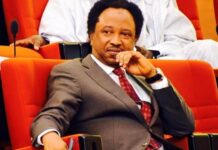The Nigerian government has found itself embroiled in a controversy over its recent signing of the $150 billion Samoa Agreement with the European Union and the Organization of African, Caribbean and Pacific States (OACPS). The agreement, which succeeded the Cotonou Agreement, has been criticized by some Nigerians for allegedly containing provisions that support Lesbian, Gay, Bisexual, and Transgender (LGBT) rights, which are contrary to the laws of the country.

The disclosure of the Samoa Agreement by the Minister of Budget and Economic Planning, Atiku Bagudu, sparked a wave of reactions online, with many Nigerians opposing what they believed was a recognition of LGBT rights. Former lawmaker Shehu Sani called on African states to “not accept loans or grants from any country, group of countries or international institutions that came with demonic conditions antithetical to our culture, religious faiths and values.”
However, the Nigerian government has strongly denied that the Samoa Agreement contains any provisions that support LGBT rights. Bagudu’s spokesman, Bolaji Adebiyi, stated that the documents signed by the Federal Government were strictly for the economic development of Nigeria and did not mention LGBT or same-sex marriage even remotely.
The Minister of Information and National Orientation, Mohammed Idris, further clarified that Nigeria’s endorsement of the agreement was accompanied by a Statement of Declaration, dated June 26, 2024, which clarified the country’s understanding and context of the agreement within its jurisdiction. Idris emphasized that any provision that is inconsistent with the laws of Nigeria would be invalid, and the government would not enter into any international agreement that would be detrimental to the interest of the country and its citizens.
The controversy surrounding the Samoa Agreement has highlighted the delicate balance between Nigeria’s international obligations and its domestic laws and cultural values. The government’s swift response to address the concerns raised by the public demonstrates its commitment to upholding the country’s stance on LGBT rights, which are currently outlawed in Nigeria.
It is worth noting that the initial draft of the Samoa Agreement did contain provisions related to LGBT rights, but these were later removed from the final agreement after negotiations. The European Parliament observed that member states were “reluctant to see the foundation agreement mention sexual orientation and gender identity (LGBTI rights),” and a compromise was reached to commit only to the implementation of existing international agreements on the matter.
As Nigeria continues to navigate the complex landscape of international agreements and domestic policies, it is crucial that the government maintains a clear and consistent stance on issues that are deeply rooted in the country’s cultural and religious values. The government’s assurance that the Samoa Agreement does not contravene Nigerian laws and that it will not enter into any agreement that is detrimental to the country’s interests is a welcome step in addressing the concerns raised by the public.




